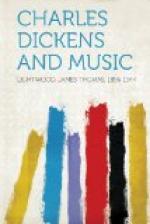This particular sonata has not hitherto been identified.
It is comforting to know that the fall of the House of Dombey made no difference to Mr. Morfin, who continued to solace himself by producing ’the most dismal and forlorn sounds out of his violoncello before going to bed,’ a proceeding which had no effect on his deaf landlady, beyond producing ‘a sensation of something rumbling in her bones.’
Nor were the quartet parties interfered with. They came round regularly, his violoncello was in good tune, and there was nothing wrong in his world. Happy Mr. Morfin!
Another ’cellist was the Rev. Charles Timson, who, when practising his instrument in his bedroom, used to give strict orders that he was on no account to be disturbed.
It was under the pretence of buying ‘a second-hand wiolinceller’ that Bucket visited the house of the dealer in musical instruments in order to effect the arrest of Mr. George (B.H.).
Harp
The harp was a fashionable drawing-room instrument in the early Victorian period, although the re-introduction of the guitar temporarily detracted from its glory. It was also indispensable in providing music for dancing-parties and concerts. When Esther Summerson went to call on the Turveydrops (B.H.) she found the hall blocked up with a grand piano, a harp, and various other instruments which had been used at a concert. As already stated, it was the sight of these instruments being carried up the stairs at The Bull in Rochester that aroused Mr. Jingle’s curiosity (P.P.) and led to the discovery that a ball was in prospect.
We must not forget the eldest Miss Larkins, one of David Copperfield’s early, fleeting loves. He used to wander up and down outside the home of his beloved and watch the officers going in to hear Miss L. play the harp. On hearing of her engagement to one of these he mourned for a very brief period, and then went forth and gloriously defeated his old enemy the butcher boy. What a contrast between this humour and the strange scene in the drawing-room at James Steerforth’s home after Rosa Dartle had sung the strange weird Irish song to the accompaniment of her harp! And how different, again, the scene in the home of Scrooge’s nephew (C.C.) when, after tea, ‘they had some music.’
Scrooge’s niece played
well upon the harp; and played,
among other things, a simple
little air.
It reminded Scrooge of a time long past.
He softened more and more; and thought that if he could have listened to it often, years ago, he might have cultivated the kindnesses of life for his own happiness with his own hand.
Little Paul Dombey told Lady Skettles at the breaking-up party that he was very fond of music, and he was very, very proud of his sister’s accomplishments both as player and singer. Did they inherit this love from their father? ‘You are fond of music,’ said the Hon. Mrs. Skewton to Mr. Dombey during an interval in a game of picquet. ‘Eminently so,’ was the reply. But the reader must not take him at his word. When Edith (the future Mrs. Dombey) entered the room and sat down to her harp,




